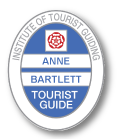Gloucestershire's connections with Charles Dickens
 |
| Charles Dickens (7th Feb 1812 - 9th June 1870) |
London played a very big part in Dickens' life and was the setting for many of his novels, but he also travelled extensively.
We will be remembering Dickens in Gloucestershire as he visited our impressive city on his travels and later came to Gloucester on one of his reading tours. He enjoyed his visits and described Gloucester as - 'a wonderful and misleading city.' After his visit to the docks he wrote "You will see, suddenly appearing, as if in a dream, long ranges of warehouses with cranes attached, endless intricacies of dock, miles of tramroad, wildernesses of timber in stacks, and huge, three-masted ships, wedged into little canals, floating with no apparent means of propulsion, and without a sail to bless themselves with."
North of Gloucester is the Medieval town of Tewkesbury which was mentioned in the Pickwick Papers, when Mr Pickwick and his friends stopped at a coaching inn - The Hop Pole, on route from Bristol to Birmingham.
 |
| The Hop Pole, Tewkesbury where Mr Pickwick, Ben Allen, Bob Sawyer & Sam Weller stayed |
| The Dickens House Museum, London |
Another interesting place in Gloucestershire is The Bibury Court Hotel, in the Cotswolds. This is supposed to have been the inspiration for Dickens' novel - Bleak House written between 1852 - 8153.
Originally Bibury Court was a grand Jacobean Manor House dating from the late 16th century and owned by the Sackville family. The house and estate passed down through the family for a number of generations then through the female line to the Cresswell family. The Cresswells were among many to suffer the injustices of the English legal system, of which Dickens was so critical, trying to sort out a disputed family will. It was supposedly this long running litigation that inspired him to write Bleak House and the case of Jarndyce v Jarndyce in the Court of Chancery.
Bibury Court was bought and sold a number of times after the court case. By the 1920's it had fallen into a delapidated estate. It was bought by the Clarke family who restored it then, when Lady Clark died in the 1980's, it was sold again and was converted to a large luxury hotel which opened in 1968.

